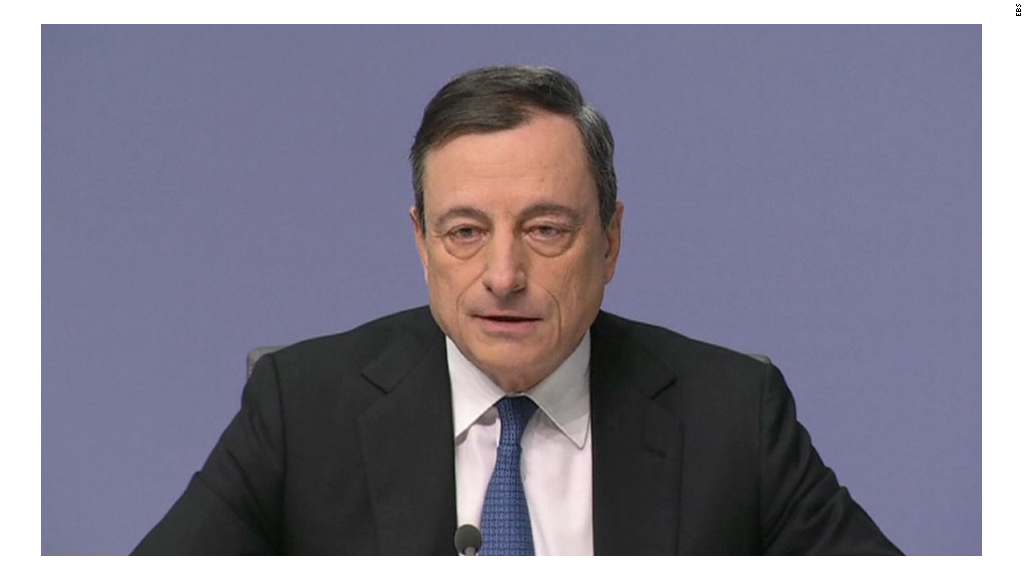
The European Central Bank finally launched a big stimulus program that's similar to the one the Federal Reserve used in the wake of the 2008 financial crisis.
And Wall Street responded with a hearty cheer of "Bellissimo!" for ECB chief Mario Draghi.
Even if you don't live in Europe, this matters. Stocks enjoyed a solid rally Thursday. The Dow gained 260 points and the S&P 500 and Nasdaq each rose more than 1.5%.
At the same time, the dollar gained more ground against the euro. The greenback hit an 11-year high. That will have ramifications for U.S. travelers and businesses.
Related: ECB unveils big new stimulus program
So why should you care?
1. Europe is finally getting serious. The ECB promised to buy more bonds than expected. So that was a pleasant surprise and the reason stocks bounced.
Draghi said Thursday that the ECB will purchase €60 billion worth of bonds a month as part of its so-called quantitative easing program, a good bit higher than chatter Wednesday predicting just €50 billion.
"The market reaction: pretty much unalloyed joy. Almost everything rallied," wrote Kit Juckes, global head of foreign exchange strategy for Societe Generale, in a report. "About the only thing which didn't rally was the Euro."
But more importantly, the ECB's announcement showed investors that Europe may finally be serious about repairing its many economic problems. That should help contain the negative spillover to the U.S.
"This is a big deal. The EU countries do not fully agree with each other but are all aligned in desire to get Europe back on track in a robust manner," said David Marcus, manager of the Evermore Global Value Fund (EVGBX).
Related: New year, same old problems for Europe
Of course, QE will not be sufficient to cure Europe's woes. Many of the individual governments that are part of the eurozone will also need to enact reforms in order to end the tide of rising unemployment, falling consumer prices and economic stagnation.
2. Weak euro is mostly good. The slide in the euro should make European goods cheaper for American consumers. That would be good news for any U.S. retailers that sell them.
And that Roman holiday you've been longing to take? Now's probably the time. That should help the airlines and big hotel chains.
Related: One U.S dollar could soon equal one euro
There could be one big negative from the ECB's QE program though. The plunge in the euro could hurt the revenue and profits of big U.S. firms with exposure in Europe.
Johnson & Johnson (JNJ), IBM (IBM) and American Express (AXP) have already noted that the stronger dollar has been a problem for them.
3. Germany isn't going to screw this up. Germany has been particularly vocal about not wanting to do more bailouts of weaker nations, such as Greece.
There have been some worries that a victory by the anti-austerity party Syriza in this weekend's Greek elections could set the stage for a showdown between Greece and Germany that would lead to Greece dropping the euro currency.
It's unclear what the ripple effects would be for the rest of Europe and the global economy and markets if that were to happen.
Related: Greece elections: Have 5 years of austerity paid off?
But Riad Younes, co-manager of the RSQ International Equity Fund (RSQIX), thinks that the "Grexit" fears are overblown.
He thinks that the ECB news is a sign that Germany, which had expressed some reservations in the past about a QE program, is willing to make some concessions for the good of the eurozone.
"Even if Syriza wins, Germany should be willing to find some common ground with Greece," he said. "A compromise is likely."
Add this all up and it's easy to understand why Wall Street is breathing a sigh of relief.
Further malaise in Europe's economy could threaten the recovery in the United States. And that's the last thing we need at a time when the Fed is finally preparing to raise interest rates.


